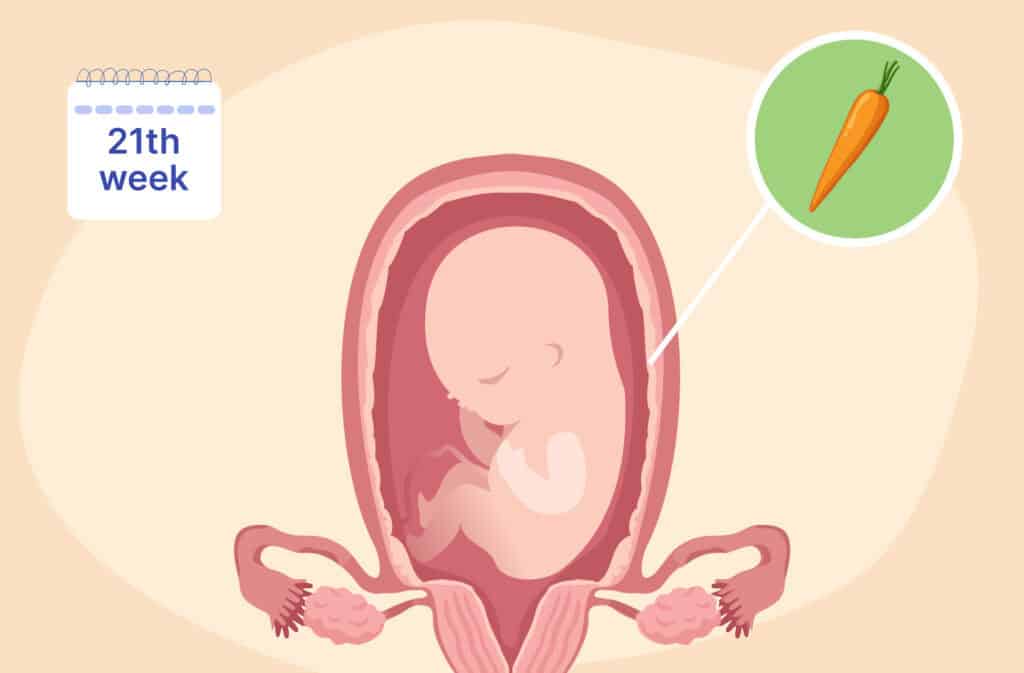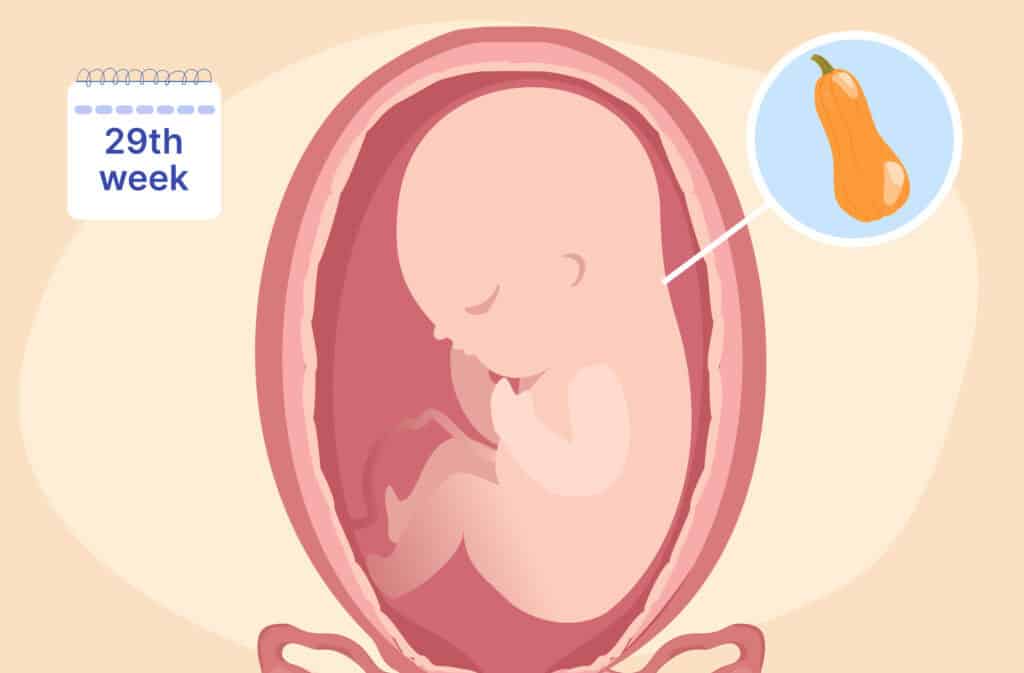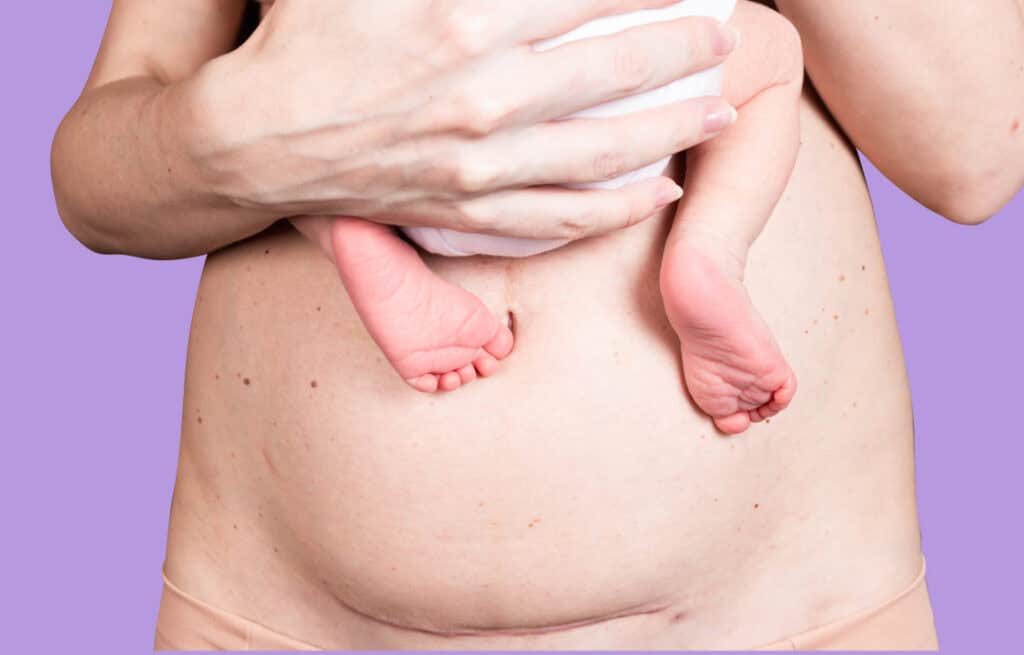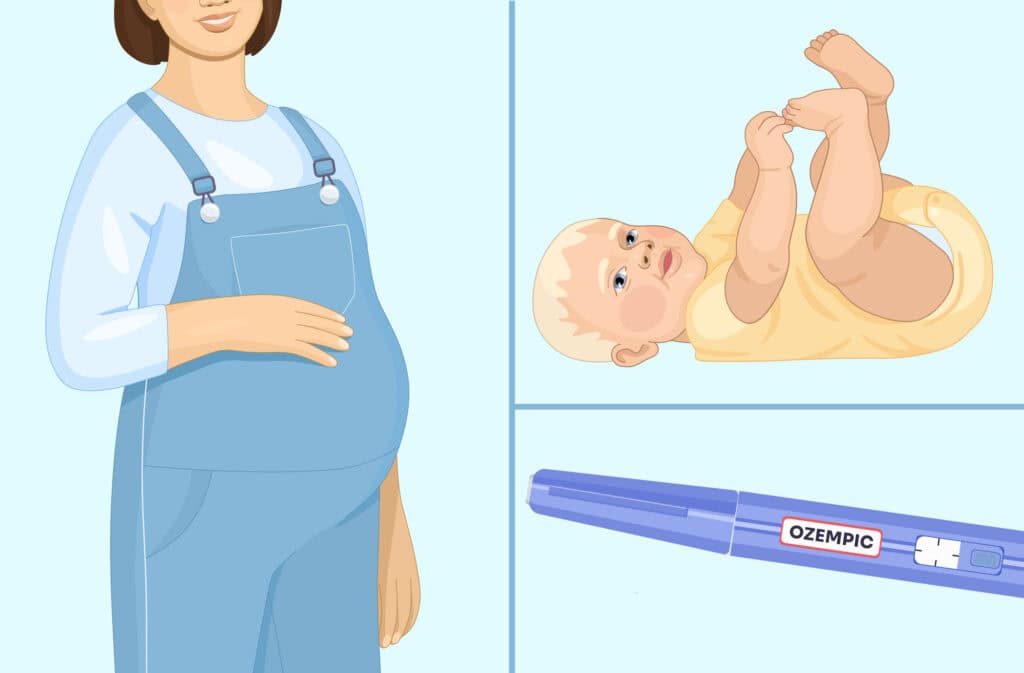Femia > Health Library > Pregnancy > Pregnancy week by week > What to know at 21 weeks pregnant: Symptoms & baby size
What to know at 21 weeks pregnant: Symptoms & baby size

- Updated Feb 20, 2025
- Published
CRAFTED BY HUMAN
Crafted by human At Femia, we provide accurate and up-to-date information at every stage of your journey, from trying to conceive, pregnancy and postnatal support. All content is created by a real person based on in-depth research and own professional experience. Femia ensures that you will receive expert advice, strict accuracy and a personalized approach from our authors/medical experts. Learn more about our editorial policy.
FACT CHECKED
Fact checked At Femia Health, we maintain the highest standards of editorial excellence in delivering content focused on helping you conceive, guiding you through pregnancy, and supporting you postpartum. Explore our content review principles to learn how we ensure the accuracy and quality of our health and lifestyle tips for every stage of your journey.
At 21 weeks pregnant, your baby is actively moving, practicing reflexes, and growing stronger. About the size of a carrot, your baby’s movements may become more pronounced, and their senses are sharpening. You may notice a rounder belly, improved energy levels, and occasional symptoms like backaches or leg cramps.
Congratulations on reaching 21 weeks pregnant! This week, your baby is growing rapidly and becoming more active in the womb. For you, week 21 is an exciting time as your belly continues to grow, and you may feel more connected with your little one through their kicks and stretches. Let’s dive into what’s happening this week, from your baby’s development to expert advice on managing symptoms and staying healthy.
Femia decodes your body’s signals and helps you track progress effortlessly
Pregnancy symptoms at 21 weeks
As you progress through week 21, here’s what you may experience:
Varicose veins
The pressure of your growing uterus can cause varicose veins, especially as progesterone levels rise, relaxing vein walls. To manage, exercise regularly, elevate your feet, avoid standing or sitting for long periods, and wear compression socks to improve blood flow.
Bleeding gums
Around 50% of pregnant individuals experience pregnancy gingivitis, causing gums to bleed when brushing or flossing. Maintain good oral hygiene with regular brushing and flossing, and visit the dentist for checkups and cleanings.
Clumsiness
As your belly grows, your center of gravity shifts, making you feel more unsteady. Take precautions to avoid falls, slow down, wear low-heeled shoes, and avoid risky activities.
Braxton Hicks contractions
These are irregular, painless “practice” contractions that usually appear around 21 weeks. They’re more common at the end of the day or after physical activities. While harmless, contact your doctor if they become regular or painful.
Heartburn
Common during pregnancy due to hormonal and physical changes, heartburn can cause discomfort. Try dietary changes to manage and minimize heartburn.
Weight gain
Expect to gain about a pound a week. Consult your doctor or midwife for personalized weight gain recommendations tailored to your health needs.
👉Find out more: Halfway there: Insights on being 20 weeks pregnant and fetal development
Your body at 21 weeks pregnant
At 21 weeks, your uterus is expanding higher into your abdomen, which may lead to some discomfort in your back or abdominal muscles. As your baby grows, your center of gravity changes, and you may feel a bit more strain in your lower back or hips.
You might also notice skin changes, such as the appearance of a dark line (linea nigra) running down your belly or the development of stretch marks. To help with these, try moisturizing your skin regularly and staying hydrated to keep your skin elastic. Eating a balanced diet supports your overall health and can also help manage changes in your body.
21-week pregnant belly
Your belly is becoming more pronounced as your baby continues to grow. Many pregnant individuals feel excited and proud of their growing bump. It’s a great time to embrace maternity clothing, as it can provide both comfort and support. As your body adjusts to these changes, make sure to listen to it and find the clothing and activities that make you feel your best during this stage. Stretching exercises and relaxation techniques can help ease some of the strain on your back and abdomen.
Baby development at 21 weeks pregnancy
- Taste buds development: Your baby’s taste buds are developing, and they’re starting to experience different flavors from the amniotic fluid.
- Sucking reflex: Your baby is practicing essential reflexes like sucking, which will be important for feeding after birth. The sucking reflex is becoming stronger as they prepare for breastfeeding.
- Sense of touch: Your baby’s sense of touch is maturing, and they can respond to external stimuli, like your voice or gentle pokes on your belly. They may also explore their surroundings with movements, reaching and touching their face or body.
- Digestive system maturing: The baby’s digestive system is growing and becoming more functional. They are swallowing small amounts of amniotic fluid, which helps develop their swallowing reflex and prepares their digestive system for life outside the womb.
21-week baby size
The 21-week fetus size is around 10.5 inches long from head to heel and weighs about 12.7 ounces—roughly the size of a carrot. As their muscles and bones strengthen, your baby’s movements will feel more distinct.
21-week ultrasound
A 21-week ultrasound may provide a detailed view of your baby’s organs, limbs, and movements. During this scan, you can check on their growth and development. If you’ve had your anatomy scan (typically done between weeks 18 and 22), you may have learned your baby’s gender, though this is optional. This ultrasound also ensures your baby’s organs, brain, and heart are developing normally.
Femia decodes your body’s signals and helps you track progress effortlessly
Tests to expect at 21 weeks pregnant
At week 21, regular prenatal care is essential to ensure you and your baby remain healthy. Here’s a breakdown of tests and their purposes:
- Routine Checkups:
- Blood pressure check: Monitoring for preeclampsia or hypertension.
- Urine test: Screening for protein (a sign of preeclampsia) and glucose (to monitor gestational diabetes).
- Glucose tolerance test (GTT): Typically scheduled between weeks 24-28 but might be discussed now. This test evaluates how your body processes sugar and identifies gestational diabetes risk.
- Anatomy scan follow-up: If not done earlier, a detailed ultrasound ensures proper organ development and checks the placenta’s position.
- Fundal height measurement: This measures the growth of your uterus and helps assess your baby’s development.
👉Find out more:
22 Weeks pregnant: Fetal development, body changes, and key insights
| Expert advice: Discuss any concerns about your baby’s growth, movements, or your symptoms during these checkups. Regular prenatal visits are an opportunity to stay informed about your health and your baby’s progress. |
Health tips and self-care at 21 weeks pregnant
Maintain good hydration
Staying hydrated is essential during pregnancy, and it helps prevent constipation, reduce swelling, and promote healthy amniotic fluid levels. Aim to drink plenty of water throughout the day, especially in warmer weather or after physical activity. Hydration also supports your body’s increased blood volume, which is vital for both you and your growing baby.
Exercise regularly
Regular, gentle exercise, such as walking or swimming, can help ease pregnancy discomforts like back pain and boost your energy levels. It’s important to keep your muscles toned and maintain healthy circulation, both of which are key for supporting your growing bump. If you experience any discomfort, always listen to your body and adjust the intensity of your workouts accordingly.
Moisturize your skin
As your belly expands, you might notice stretch marks appearing, or your skin becoming drier. Using a good pregnancy-safe moisturizer regularly will help maintain skin elasticity and reduce the itchiness that often comes with stretching. Look for creams containing ingredients like cocoa butter or vitamin E, which are known to nourish and hydrate the skin.
Watch your posture
As your uterus grows and shifts upward, your center of gravity changes, which can lead to back discomfort or muscle strain. To prevent this, practice good posture by standing tall, avoiding slumping, and using a supportive chair when sitting. Pregnancy support belts can also help relieve some of the pressure on your back and belly, making it easier to stay comfortable throughout the day.
Eat a balanced diet
At 21 weeks, it’s essential to maintain a healthy, well-rounded diet to support your baby’s growth and development. Focus on nutrient-dense foods like whole grains, lean proteins, fruits, and vegetables. Include plenty of calcium-rich foods, such as dairy or fortified alternatives, to support your baby’s developing bones and teeth.
Questions from the Femia community
What is a nesting syndrome?
Nesting syndrome is the instinct to prepare your home for your baby’s arrival, often involving organizing, cleaning, or decorating. It’s completely normal and often peaks in the third trimester.
Should I be vaccinated during pregnancy?
Yes, vaccines like the flu shot, RSV vaccine, and Tdap are recommended during pregnancy to protect you and your baby from serious illnesses. Discuss vaccination timing with your healthcare provider.
Where does the baby kick at 21 weeks?
At 21 weeks, you may feel your baby kick low in your abdomen, near the pelvis, but as they grow, kicks can be felt higher up.
What position should I sleep in at 21 weeks pregnant?
It’s recommended to sleep on your left side to improve blood circulation to your baby and reduce pressure on your organs.
Is the baby fully developed at 21 weeks?
At 21 weeks, your baby is not fully developed, but many key organs, such as the heart and kidneys, are functioning, and they are practicing essential reflexes.
Can a baby survive if born at 21 weeks?
Babies born at 21 weeks are considered extremely premature and have very low survival chances. Medical advancements have improved outcomes for later premature births, but survival rates at 21 weeks are very rare.
The bottom line
At 21 weeks pregnant, your baby is developing rapidly, practicing movements, and responding to sounds. Your belly is more prominent, and symptoms like back pain or leg cramps may arise. Focus on hydration, balanced nutrition, and staying active to support your health and enjoy this exciting stage.
References
- “21 Weeks Pregnant: Symptoms, Baby Development & Tips.” BabyCenter, www.babycenter.com/pregnancy/week-by-week/21-weeks-pregnant.
- “Week 21 of Pregnancy: Symptoms, Baby Development & More.” What to Expect, www.whattoexpect.com/pregnancy/week-by-week/week-21.aspx.
- “21 Weeks Pregnant: Baby Development, Symptoms & Tips.” NHS, www.nhs.uk/pregnancy/week-by-week/1-to-12/21-weeks/.
- “Pregnancy Week 21: What to Expect.” American Pregnancy Association, www.americanpregnancy.org/healthy-pregnancy/week-by-week/21-weeks-pregnant/.

Discover what happens at 29 weeks pregnant, from baby development and symptoms to contraction tips and self-care advice.

If you’re self-conscious about your postpartum belly, try these tips for a flat tummy after pregnancy. Find out how to lose postpartum fat.

Discover how Ozempic affects fertility and pregnancy. Learn about ‘Ozempic babies’, potential risks, and alternatives for managing weight while trying to conceive.

